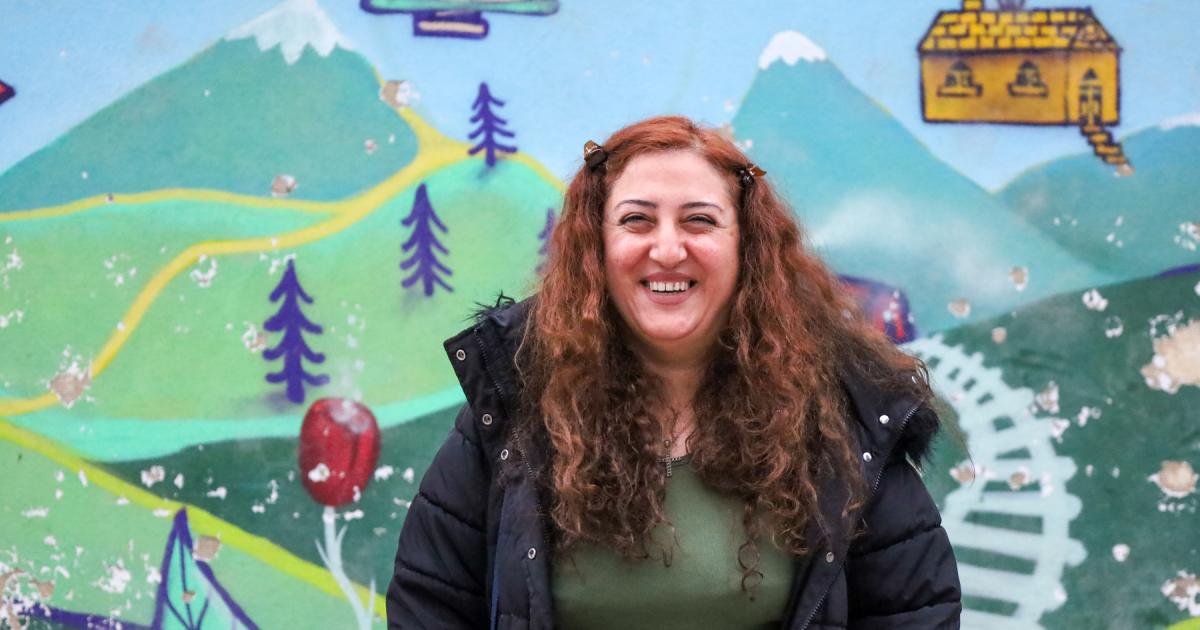Sarajevo, Bosnia and Herzegovina – “I’ve always carried faith in my heart,” begins Farah, a 39-year-old woman from Iran, her voice steady, yet trembling from the weight of past experiences on her shoulders. “I grew up in a family of believers, and whenever life threw challenges my way – and there were many on this journey – I felt as though I could hear God’s voice, gently reassuring me, ‘Don’t worry, you’re not alone. I am with you.”
Farah has been away from her home in Iran for nine years, living in a temporary reception center in Ušivak, on the outskirts of Sarajevo. Through her radiant smile, she reveals a strength that rises above the many hardships that she endured. Even in the darkest moments of her journey, she clung to hope, with faith serving as her lifeline. Her story is one of resilience – proof of the power of courage to overcome adversity, reiterating the importance of never giving up on life’s dreams.
Farah was given up for adoption at birth and has never known her biological parents. Yet she speaks with gratitude for the loving family who raised her and provided a solid foundation in her formative years. As a young woman in Iran, she attended Shiraz University, graduated and worked as a teacher, a career that she excelled at.
Though Farah is not yet ready to share the full details of her story, unforeseen circumstances in Iran left her in an increasingly unsafe environment, forcing her to leave behind everything she once cherished. Thus began her journey in search of safety and a better future.
Farah told no one about the decision to leave Iran – not even her mother. It was only after safely crossing the border that she called to reassure her family that she had made it to Türkiye. Though separated by distance, Farah went to great lengths to stay in touch with her mother even as she faced an uncertain journey ahead.
Farah’s first stop brought her to Türkiye, where she spent nine grueling years working in factories, hotels, or any menial job to sustain herself, while carrying the full weight of trauma and vulnerabilities as she tried to survive.
Farah knew that she needed to move on and so began an exhausting migration journey with the hope of reaching Finland in search of safety firmly in her mind. Reaching Greece, her sense of safety and belonging remained elusive. Undeterred, she continued through the Western Balkans, crossing Albania and Montenegro, before finally arriving in Bosnia and Herzegovina. Along the way, she was robbed of all her hard-earned savings and possessions, leaving her with nothing but faith and determination.
In 2024, more than 25,147 migrants were registered in Bosnia and Herzegovina, a major transit country along the Western Balkan route. The lack of safe pathways has left many, like Farah, exposed to exploitation and danger. According to IOM’s latest report, 34% of migrants interviewed in the Western Balkans declared resorting to facilitators often out of desperation—a perilous choice that increases their vulnerability. Despite these hardships, tailored support can offer much-needed relief amidst these long and uncertain journeys, highlighting the need for comprehensive systems that enable safe migration.
It is when Farah finally arrived in Bosnia and Herzegovina, that her journey took an unexpected turn for the better “For the first time, I felt truly heard. I experienced kindness from people working at the center and the authorities – something I had not known for years. It really helped me in overcoming my fears that had gripped me like a vice ever since the day I fled Iran.”
Farah is deeply grateful for the support she received from IOM, partners in the field, and the compassionate treatment of the authorities in Bosnia and Herzegovina, helping her to regain confidence and trust in others. Photo: Ervin Caušević
Accommodated in the temporary reception centre in Ušivak, she found comfort in the social activities provided, which offered a sense of community in a safe and supportive environment. This helped Farah find a renewed sense of hope and the strength to keep moving forward, despite the long road ahead.
Farah is determined to continue her studies and hopes one day of becoming a university professor. Despite all the challenges she has overcome Farah has a burning desire to pursue this goal and this keeps her focused and driven.
As Farah reflects on her journey, she does not shy away from the harsh reality of her migration journey. “When you go on this journey as a woman, anything can happen – violence, mistreatment, even assault. You are no longer the same person, you have seen too much, experienced too much, and the trauma leaves a mark on your mental health.” Yet Farah accepts these challenges with remarkable courage but urges others to carefully evaluate their circumstances before deciding to leave their homeland.
Through Farah’s story, we are reminded of the immense challenges migrants face and the profound need for compassion, understanding, and support. Her resilience highlights the critical importance of creating safe, regular migration pathways for those leaving their homes, allowing them to rebuild their lives with dignity and hope. In the Western Balkans, IOM also helps vulnerable migrants navigate their journeys with dignity, offering vital services such as shelter, healthcare, and psychosocial support and ensuring they have access to safe spaces, legal information, and services designed to protect their rights.
